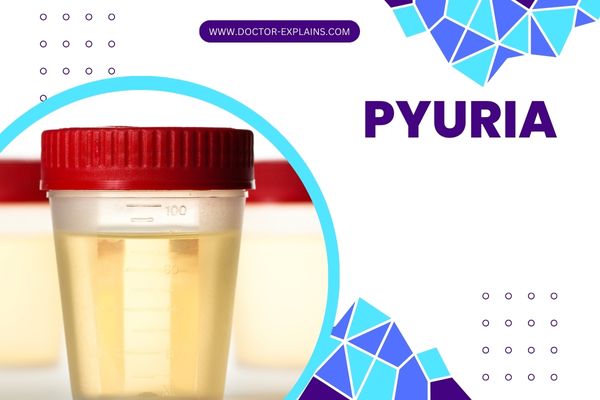How to Reduce Pus Cells in Urine:
The most common cause of pus cells in urine (pyuria) is cystitis (acute uncomplicated urinary tract infection). Recurrent cystitis is a global health problem affecting millions of women in the USA and worldwide.
Women are 30 times more likely to have cystitis than men due to shorter urethra, making it easier for the bacteria to enter their urinary bladder (leading to UTI and pyuria).
This article is for women who suffer from recurrent UTIs and pus cells in the urine. I will discuss, from a doctor’s perspective, the evidence and the efficacy of the common remedies used to prevent and reduce pus in urine due to recurrent UTIs.
KEY FACTS:
- Pus cells in urine (pyuria) is most commonly caused by cystitis (acute uncomplicated urinary tract infection).
- Women are more likely to have cystitis and pyuria than men due to shorter urethra.
- The first-line treatment is antibiotics to reduce pus in urine due to UTI.
- Drink more water to reduce UTI and pyuria incidence.
- Good hygiene habits can help prevent recurrent cystitis.
- Cranberries may be effective in reducing the risk of UTI and pyuria.
- Vitamin C and D-mannose may help prevent UTI and pyuria.
- Long-term antibiotic prophylaxis is another option for recurrent UTIs.
[1] Take an antibiotic.
If pus in urine is due to an active infection (UTI), the only way to reduce pus in urine is to cure the current UTI.
The pus cells seen in urine or in urine analysis must be followed by a urine culture and sensitivity test to confirm UTI and to test for the best antibiotic.
Antibiotics are prescription medicines and are not available over the counter. Ask your doctor about the best antibiotic that suits your case.
Common first-line antibiotics used to treat UTI and reduce pyuria include (reference):
| ANTIBIOTIC | DOSE | DURATION |
|---|---|---|
| Nitrofurantoin (Macrobid®) | 100 mg Tablets twice daily | 5 days. |
| Trimethoprim-Sulfamethaxal (Septra®). | 160/800 mg Twice daily | 3 days |
| Fosfomycin (Monurol®) | 3 g oral tablets. | Single dose |
| Trimethoprim (for patients with Sulfa allergy) | 100 mg oral tablets twice daily | 3 days. |
Antibiotics are the cornerstone treatment of UTI-related pyuria and are the direct, straightforward way to reduce pus in the urine.
If pus in urine is not associated with a positive urine culture test (no bacteria is detected by the standard culture test), then the condition is called sterile pyuria.
Sterile pyuria is due to either infection with atypical bacteria, viruses, fungi, non-infectious causes, or due to the recent use of antibiotics.
The treatment of sterile pyuria depends on its cause. Learn More.
[2] Drink more water.
One study on 140 women with recurrent cystitis (UTI) found that women who raised their daily fluid intake from <1.5 liters had a 50% less risk of recurrent UTI and pyuria when they added an extra 1.5 L per day of fluid.
Women who habitually drink less water are at higher risk of recurrent UTIs and pus cells in the urine.
So, to reduce the incidence of pus in urine and UTI, try to drink at least 2.5 to 3 L per day (85-100 F. Oz).
[3] Practice more hygiene.
Researchers believe that the bacteria causing UTI comes from your colon and enters the bladder through the urethra.
Wiping from back to front and wearing tight, synthetic underwear may increase the risk of recurrent UTI and pyuria.
So, “avoiding” certain habits may be as effective as antibiotics in preventing recurrent cystitis.
Try these hygienic remedies that help you reduce the incidence of recurrent pyuria:
- Wipe from front to back: This will decrease the risk of transmission of bacteria (such as E. Coli) from the anorectal area to the urethra.
- Loose-fitting cotton underwear: This will keep the perineal area dry and decrease the contamination by bacteria.
- Pee after intercourse
[4] Try a cranberry product.
According to a meta-analysis of 9 studies, people who take cranberry are 38% less likely to have UTIs (Odds Ratio is 0.62).
The same meta-analysis found that cranberry is even more effective in preventing recurrent UTI and pyuria, with people who take cranberry having a 47% lower risk.
Although the evidence of its benefits is not strong, it is worth trying to take a cranberry supplement if you suffer from recurrent UTI or pyuria.
It’s always a good idea to check with your doctor before starting any new supplement or treatment.
RECOMMENDED PRODUCT:
AZO Cranberry is the leading cranberry brand for women with recurrent UTIs. The AZO cranberry (Urinary Tract Health) contains:
- Cranberry.
- A probiotic.
- And Vitamin C.
[5] Get enough vitamin C.
Vitamin C helps boost the immune system, which is important for the integrity of the capillaries and small blood vessels inside the urinary tract.
A deficiency of vitamin C may predispose to UTI, pyuria, and UTI bleeding (hematuria). So, it is important to ensure you are getting enough vitamin C.
Vitamin C is abundant in some dietary sources such as citrus fruits, Guava, and bell peppers.
It is also available as a supplement (AZO cranberry tablets contain vitamin C).
[6] Try a urinary tract probiotic.
A study found that women who took a combination of cranberry and probiotics had a significantly lower risk of recurrent UTIs compared to those who did not take the combination. The study also found that the combination was effective in reducing the number of bacteria in the urine. You can read the study here.
Research shows that combining cranberry and. probiotics may be even more effective in reducing recurrent UTI and pyuria (reference).

RECOMMENDED PRODUCT:
AZO Cranberry is the leading cranberry brand for women with recurrent UTIs. The AZO cranberry (Urinary Tract Health) contains:
- Cranberry.
- A probiotic.
- And Vitamin C.
[7] Ask your doctor about your contraceptive methods.
Spermicide-coated diagrams and other spermicide-containing contraceptive methods are known risk factors for UTI and pyuria. Changing such contraceptive methods will eventually reduce UTI and pyuria risk.
Moreover, if you are an older post-menopausal woman, using vaginal estrogen effectively prevents UTIs.
[8] Try D-Mannose natural sugar.
D-mannose is a natural sugar that fights bacteria and reduces recurrent inflammation and pyuria in the urinary tract.
According to a 2013 study, D-mannose was tested on 308 women who experienced frequent UTIs. The study found that D-mannose was just as effective as the antibiotic nitrofurantoin in preventing UTIs over a period of 6 months (reference).
[9] Ask your doctor about long-term antibiotic prophylaxis.
Long-term (continuous or post-coitus) antibiotic prophylaxis is another option that your doctor can try if you have recurrent UTI and pus cells in your urine for a long period.
Your doctor may decide to give you long-term antibiotics according to the following indications (reference):
- Women with frequent UTI recurrent (Two or more within 6 months).
- Women who are bothered by symptoms with failure of the other measures.
However, long-term antibiotics may have side effects. Discuss the issue with your doctor to determine the best options for your case.
Commonly used antibiotics:
- Nitrofurantoin.
- Trimethoprim-sulphamethoxazole.
- Trimethoprim.
- Cephalexin.
- Cefaclor.
- Fosfomycin.






